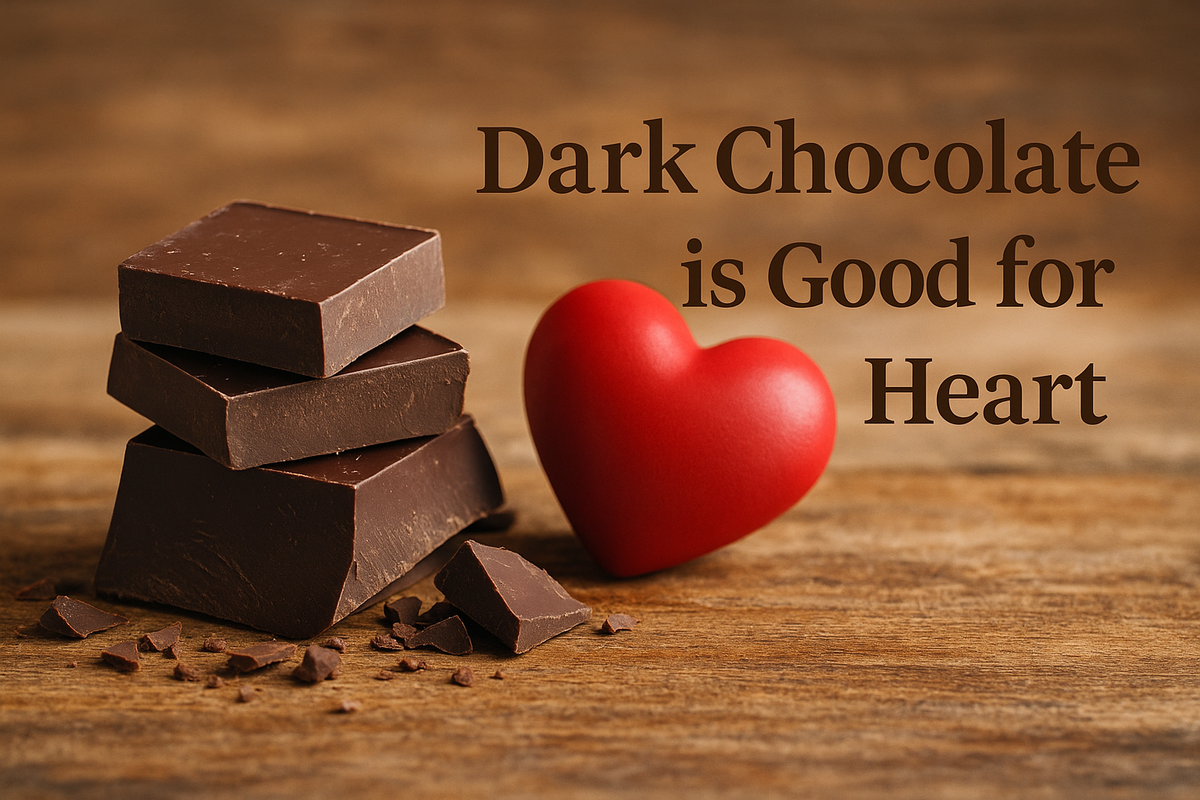Dark Chocolate is Good for Heart ❤️ | Health Benefits Explained
Dark Chocolate is Good for Heart. There are many benefits to chocolate consumption for health like health, Diabetes and many more.

When we think of chocolate, we often picture indulgent desserts or sweet cravings 🍫. But did you know that **dark chocolate**—especially the sugar-free dark chocolate—can actually be a friend to your heart? 💓 Yes, you read that right! Research over the last few decades has increasingly pointed to dark chocolate as more than just a treat; it’s a functional food with real **cardiovascular benefits**.
What Makes Dark Chocolate Special? 🌱
Unlike milk chocolate or white chocolate, dark chocolate contains a higher concentration of **cocoa solids**, which are rich in **flavonoids**, particularly a subtype called **flavanols**. These powerful compounds have **antioxidant and anti-inflammatory** effects, both of which are essential for maintaining a healthy heart.
- 🍀 **Rich in Antioxidants** – Helps reduce oxidative stress.
- 💉 **Improves Blood Flow** – Flavanols help dilate blood vessels, improving circulation.
- 🩺 **Lowers Blood Pressure** – Regular intake can gently reduce hypertension.
- 💖 **Supports Healthy Cholesterol Levels** – Increases HDL (good cholesterol) and lowers LDL (bad cholesterol).
The Heart-Healthy Benefits of Dark Chocolate ❤️
According to studies published in medical journals like the **British Medical Journal (BMJ)** and **Harvard Health**, people who consume moderate amounts of dark chocolate experience improved cardiovascular health. Here’s a closer look at how dark chocolate supports your heart:
1. Reduces Risk of Heart Disease
Dark chocolate’s flavonoids help prevent the oxidation of LDL cholesterol. Oxidized LDL is a key player in plaque buildup in arteries, leading to heart attacks and strokes. Consuming dark chocolate can slow this process and support **arterial flexibility**.
2. Enhances Endothelial Function
The endothelium is the inner lining of blood vessels. Flavanols improve **nitric oxide** production in the body, which helps relax blood vessels and improve blood flow. This is crucial for people with high blood pressure or cardiovascular risk.
3. Reduces Inflammation
Chronic inflammation is at the core of many diseases, including heart disease. The antioxidants in dark chocolate fight free radicals and reduce inflammation at a cellular level, leading to a **healthier cardiovascular system**.
Why Sugar-Free Dark Chocolate is Even Better 🧠
While regular dark chocolate has many health benefits, it's important to avoid the added sugar commonly found in commercial bars. Excess sugar can raise insulin levels, increase triglycerides, and promote **inflammation**—the very things we’re trying to avoid for heart health.
That’s where sugar-free dark chocolate shines. It provides all the heart-protective benefits of cocoa without the health risks associated with sugar. This makes it especially valuable for people managing diabetes or those on **low-carb** or **keto diets**.
Diabetic-Friendly and Heart-Approved ✅
If you're diabetic, you're already aware of the dangers of sugar. Sugar-free dark chocolate uses sweeteners like stevia or monk fruit, which have **minimal impact on blood sugar levels**. Combined with the **benefits of dark chocolate**, it's the perfect heart-smart snack.
How Much Dark Chocolate Should You Eat for Heart Health? 🍬
Moderation is key. Experts recommend about **1 to 1.5 ounces (30-40 grams)** of dark chocolate per day. Make sure it contains **at least 70% cocoa** or more to get the full cardiovascular benefits.
Remember, dark chocolate still contains calories and fats, so balance is crucial. It should complement a healthy lifestyle—not replace it!
How to Choose the Right Dark Chocolate 🛒
- ✅ Look for 70% cocoa or higher
- ✅ Go sugar-free when possible
- ✅ Avoid artificial flavors or hydrogenated oils
- ✅ Choose organic and fair-trade when available
Incorporating Dark Chocolate Into Your Diet 🍴
Here are some creative and heart-healthy ways to enjoy dark chocolate:
- 🍓 Dip fresh berries in melted sugar-free dark chocolate
- 🥣 Add shavings to oatmeal or Greek yogurt
- ☕ Mix cocoa powder into smoothies or coffee
- 🍪 Bake heart-healthy cookies using dark chocolate chips
Real-Life Stories: Dark Chocolate and Heart Health 🧓
Many people have improved their cardiovascular health simply by swapping their sweet treats for sugar-free dark chocolate. Testimonials from fitness enthusiasts, seniors managing diabetes, and even athletes have highlighted better **blood pressure control**, **improved mood**, and even **weight management**.
The Benefits Go Beyond the Heart 💪
Don't forget that the benefits of dark chocolate extend beyond cardiovascular health:
- 🧠 Boosts brain function
- 😊 Enhances mood and reduces stress
- 🧬 Supports immune function
- 🦴 Provides essential minerals like magnesium, iron, and zinc
Final Thoughts 💭
Dark chocolate isn’t just a guilty pleasure—it’s a **superfood for your heart** when chosen wisely. Whether you’re watching your weight, managing blood sugar, or simply trying to live a heart-healthy lifestyle, incorporating **sugar-free dark chocolate** into your diet can be a delicious and smart decision.
So go ahead, enjoy a square or two today. Your heart will thank you! ❤️
Stay healthy. Stay happy. And don’t forget to savor life—one chocolate square at a time! 🍫





